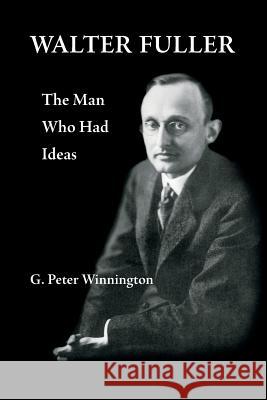Walter Fuller: The Man Who Had Ideas » książka
Walter Fuller: The Man Who Had Ideas
ISBN-13: 9782970065432 / Angielski / Miękka / 2014 / 432 str.
Walter Fuller: The Man Who Had Ideas
ISBN-13: 9782970065432 / Angielski / Miękka / 2014 / 432 str.
(netto: 153,30 VAT: 5%)
Najniższa cena z 30 dni: 159,20
ok. 16-18 dni roboczych.
Darmowa dostawa!
This is no ordinary biography. Using unpublished sources, Peter Winnington reveals the life of Walter Fuller, whom the BBC chose to edit its Radio Times. Covering the first quarter of the 20th century, the unfolding story takes us from the birth of student representation and the revival of folksong (first as entertainment, then as social protest) to the anti-war movement in America, for which Fuller produced innovative propaganda. The US harshly repressed its pacifists and conscientious objectors. To defend them, Fuller imported from Britain the concept of civil liberties, and his wife Crystal Eastman co-founded the American Civil Liberties Union. Back in England after WWI, Fuller was headhunted for his ideas by the BBC, where he helped shape its public image and gave Radio Times a format which lasted for fifty years. This account throws new light on the development of social and political ideas which still affect our lives today. Counterpointing this story is the life of Fuller's sister Rosalind, whose philosophy of free love had the seal of approval of Lord Bertrand Russell. She inspired in Scott Fitzgerald the story that paid for his wedding, entranced John Barrymore when she played Ophelia to his Hamlet on Broadway, and caused Nobel Prize winner Sir Norman Angell to tell a whopper in his autobiography. "Highly readable and carefully researched" - Martin Ceadel, Professor of Politics, University of Oxford. G. Peter Winnington's previous books have included biography and literary criticism. Of his life of Mervyn Peake, the TLS declared: "Winnington is good not only as a biographer but as a critic" too.
This is no ordinary biography. Using unpublished sources, Peter Winnington reveals the life of Walter Fuller, whom the BBC chose to edit its Radio Times. Covering the first quarter of the 20th century, the unfolding story takes us from the birth of student representation and the revival of folksong (first as entertainment, then as social protest) to the anti-war movement in America, for which Fuller produced innovative propaganda. The US harshly repressed its pacifists and conscientious objectors. To defend them, Fuller imported from Britain the concept of civil liberties, and his wife Crystal Eastman co-founded the American Civil Liberties Union. Back in England after WWI, Fuller was headhunted for his ideas by the BBC, where he helped shape its public image and gave Radio Times a format which lasted for fifty years. This account throws new light on the development of social and political ideas which still affect our lives today. Counterpointing this story is the life of Fullers sister Rosalind, whose philosophy of free love had the seal of approval of Lord Bertrand Russell. She inspired in Scott Fitzgerald the story that paid for his wedding, entranced John Barrymore when she played Ophelia to his Hamlet on Broadway, and caused Nobel Prize winner Sir Norman Angell to tell a whopper in his autobiography. "Highly readable and carefully researched" - Martin Ceadel, Professor of Politics, University of Oxford. G. Peter Winningtons previous books have included biography and literary criticism. Of his life of Mervyn Peake, the TLS declared: "Winnington is good not only as a biographer but as a critic" too.











